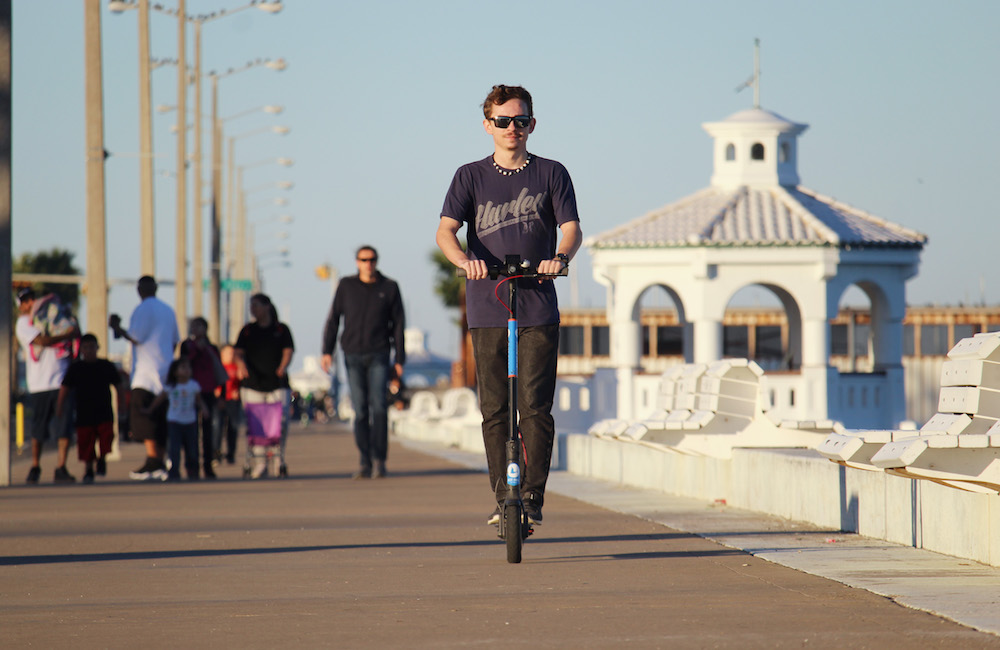
Adrian Garcia, 19, of North Beach in Corpus Christi takes a ride on a Blue Duck scooter along the downtown seawall. Blue Duck is offering free rides throughout January as a promotion. Photo by Carrie Robertson Meyer
A rate that one scooter company says “far exceeds” what other cities are charging to license dockless scooters could be approved and finalized on second reading Tuesday, Jan. 15. A first reading of the six-month pilot program to license city right-of-way to scooter companies was approved at the Corpus Christi City Council meeting Jan. 8.
Major issues addressed concern scooters blocking handicapped access to sidewalks and streets, police involvement in enforcing regulations, and, from at least one scooter company, the cost of a right-of-way license.
Tim Barnett, a representative of the Lime scooter company politely protested the $1-per-scooter-per-day fee. Lime is one of three scooter companies currently operating in the city. The other two are Blue Duck and Bird.
“San Antonio charges $20 per scooter per year,” he told the council during the hour-long discussion. “So, $365 (a year per scooter) is much higher than other cities and prohibitive for us to do our work here. Please allow us to shift from a per-scooter to a per-ride fee.”
City staff firmly reiterated to the council that they had unanimously agreed on the $1-per-scooter-per-day fee, and the city approved the proposed ordinance 7-2. Council members Everett Roy and Raul Garza Jr. voted against the ordinance.
Blocking handicapped access stirred the most discussion with council members recounting their own experiences of seeing wheelchair-bound constituents unable to cross a street because of poorly parked scooters.
“As a community, we spent tens of millions of dollars making our community ADA-accessible,” said Garza, referring to the Americans with Disabilities Act. “I see (scooters) in the morning all lined up nice and neat. By the afternoon, they are everywhere.”
His next point hit home with many in the room, including Police Chief Mike Markle: Who was going to pick them up during the day? Did the companies expect the police department to handle that?
“I am not in agreement that police should patrol these scooters or handle these issues,” council member Paulette Guajardo said. “We have to look at the cost of code enforcement. I like the scooters, but I’m concerned about this.”
Markle explained that parking control officers, not police officers, would handle enforcement of any regulations approved by the City Council. Because the program is a pilot, the first workers on the job would be temps.
“We are going to move through this together and keep police officers out of the business,” Markle said. “They don’t need to be picking up scooters. Parking control can do that.”
Barnett explained that his company plans to hire people locally to monitor and maintain the scooters to avoid inconveniences.
Garza said the responsibility for policing scooter parking should be pushed back on the companies making the profit.
“I don’t want to have to add people to work for the city to police this,” he said. “That should be go to the industry. They can figure out how to fix it.”
Mayor Joe McComb added that his main concern was safety.
“If you think everyone riding is going to be 18 years old and have a driver’s license and helmet, you’re smoking something,” he said. “I’ve seen parents running around with their kids on a scooter, no helmet, two or more on a scooter. What’s the liability when someone gets killed on one of these scooters? Or, a scooter runs into someone on a sidewalk? Who’s liable? Our job is to protect people’s lives.”
He also said he did not want city budgets to become dependent on the extra money licensing fees would bring in.
“We don’t know if (scooters) are the latest flavor of the month or not,” he said. “Whatever revenue is generated needs to be going to enforcement.”
Dockless scooters made their first appearance on Corpus Christi sidewalks last October. By the end of the month, city staff had met with scooter companies to discuss insurance concerns and regulations. Currently, the scooters must only meet state regulations, which simply restrict scooters to streets with a 35-mph or less speed limit.
While scooter companies encourage riders to wear helmets and either have a valid driver’s license — which you can have at 16 years old — or be 18 to ride, neither the state nor the city addresses the issues of age or safety.





